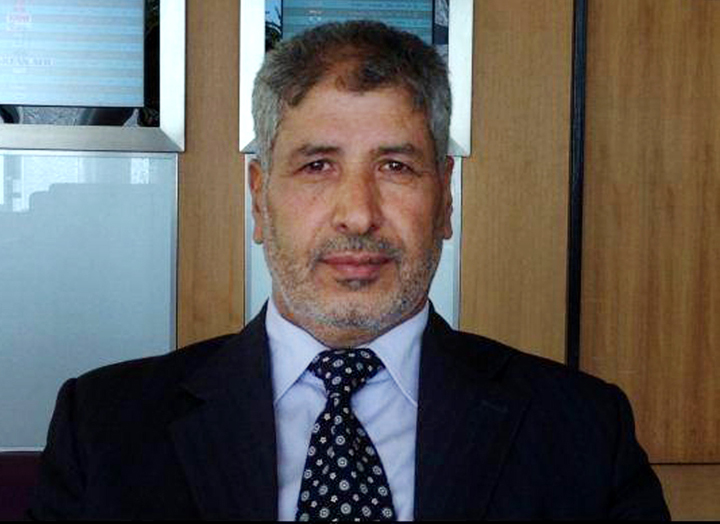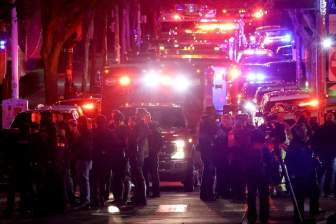BEIRUT – The Western-backed Free Syrian Army has appointed a new military chief, opposition groups announced Monday as they try to restructure a rebel movement that has fallen into disarray as it faces rampant infighting and declining international support for its fight to topple President Bashar Assad.

Brig. Gen. Abdul-Ilah al-Bashir replaces Gen. Salim Idris, who was criticized by many in the opposition for being ineffective and lost the confidence of the U.S. and its allies particularly after Islamic extremists seized a weapons depot from moderate rebels. The move was announced Monday in a statement by the FSA’s Supreme Military Council.
READ MORE: Kerry visits UAE for talks on Syria
Al-Bashir, who previously headed the group’s operations in the province of Quneitra on the border with the Israeli-occupied Golan Heights, is considered a moderate Islamist. In speeches, he has said he supports a democratic Syria but also cites heavily from the Qur’an, the Islamic holy book.
His appointment, which was made by consensus among the FSA’s 30-member military council late Sunday, is seen as part of attempts to revamp and restructure the Free Syrian Army after a series of embarrassing setbacks and to try to convince the West to provide more powerful weaponry. It also seeks to show rival rebels that the group is re-energizing with a new, credible leadership.
READ MORE: Activist group says 140,000 people have been killed in Syrian conflict
The FSA — a loose coalition of mainstream rebel groups — has seen its influence sharply wane and has suffered a series of setbacks in the past year, including an embarrassing raid on its weapons warehouse by Islamic extremists last year, which led to a temporary suspension of U.S. non-lethal aid to the rebels. The FSA has been further weakened in the past few months by deadly infighting with an al-Qaida breakaway group, the Islamic State of Iraq and the Levant.

Get daily National news
The moderate opposition hopes to show that the coalition is strengthening the drifting, chaotic and ever-weakening groups that comprise the coalition. Western donors have refrained from providing weapons, fearing they will fall into the hands of hard-line militants.
Al-Bashir is a respected commander involved in day-to-day fighting, whose son was killed fighting on the side of the rebels last year. His appointment sends a two-pronged message, said analysts and rebels.
“All of this is based, at least in some part, in trying to send a message to Western backers that moderates do still hold great potential strength in this conflict and they are capable of unifying their forces,” said researcher Charles Lister, visiting fellow at the Brookings Doha Center. “I think it comes as part of a wider process as an overall restructuring of much of the armed opposition.”
The switch comes after two recent rounds of failed peace talks in Switzerland between Assad’s government and exiled opposition activists. The FSA also has lost influence amid fierce infighting with hard-line groups that appear to have better funding and training and are playing an increasingly prominent role in the uprising, particularly in northern and eastern Syria.
A spokesman for the coalition’s military council, Col. Qassem Saadeddine, said the turning point was when Islamic extremists seized warehouses belonging to the group near the Turkish border in December. The raid prompted a sudden cutoff of Western supplies to the rebels, leaving fighters without arms and scattering already weakened opposition forces.
“We waited three months after the assault and seizure of the (warehouse),” Saadeddine told the Arabic channel Al-Arabiya. “But the situation only became worse… The military leadership was scattered, each leader of a brigade worked alone. He blamed Idris for failing to resolve the crisis.
The council appointed Col. Haitham Afiseh as al-Bashir’s deputy. It has made other significant military reforms. In the days leading to January talks in Switzerland between opposition activists and Assad’s officials, the coalition formed a new northern front, and in February, a southern regional front, uniting chaotic groups.
Al-Bashir hails from one of the region’s most important tribes, the al-Nuaim tribe, giving him influence among Syria’s conservative rural areas, where tribal connections are important.
Anti-government activist, Jamal al-Golani said al-Bashir defected from Assad’s Syrian army by the end of 2011, and subsequently led a series of successful battles that seized villages and towns in northern, central and southern Quneitra province for the opposition.
His son Talal, also a rebel, was killed in battle in Quneitra, giving al-Bashir even more respect as a man who was willing to sacrifice his own sons for the Syrian revolution, al-Golani said.
The conflict started in March 2011 as a largely peaceful uprising against Assad but eventually morphed into a civil war, with more than 140,000 people killed, according to activists.







Comments